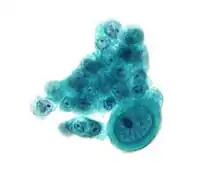Pleomorphism (cytology)
Pleomorphism is a term used in histology and cytopathology to describe variability in the size, shape and staining of cells and/or their nuclei. Several key determinants of cell and nuclear size, like ploidy and the regulation of cellular metabolism, are commonly disrupted in tumors.[1] Therefore, cellular and nuclear pleomorphism is one of the earliest hallmarks of cancer progression and a feature characteristic of malignant neoplasms and dysplasia.[2][3] Certain benign cell types may also exhibit pleomorphism, e.g. neuroendocrine cells, Arias-Stella reaction.

A rare type of rhabdomyosarcoma that is found in adults is known as pleomorphic rhabdomyosarcoma.[4]
Despite the prevalence of pleomorphism in human pathology, its role in disease progression is unclear. In epithelial tissue, pleomorphism in cellular size can induce packing defects and disperse aberrant cells.[5] But the consequence of atypical cell and nuclear morphology in other tissues is unknown.
References
- Schmoller, Kurt M.; Skotheim, Jan M. (December 2015). "The Biosynthetic Basis of Cell Size Control". Trends Cell Biol. 25 (12): 793–802. doi:10.1016/j.tcb.2015.10.006. PMID 26573465.
- Travis, W.D.; Brambilla, B.; Burke, A.P; Marx, A.; Nicholson, A.G. WHO Classification of Tumours of the Lung, Pleura, Thymus and Heart. Lyon: International Agency for Research on Cancer. ISBN 978-92-832-2436-5.
- El-Naggar, A.K.; Chan, J.C.K.; Grandis, J.R.; Takata, T.; Slootweg, P.J. WHO Classification of Head and Neck Tumours. Lyon: International Agency for Research on Cancer. ISBN 978-92-832-2438-9. Archived from the original on 2019-10-31. Retrieved 2019-10-31.
- Okazaki, Mitsuyoshi; Tajima, Hidehiro; Ohbatake, Yoshinao (21 April 2020). "Pleomorphic rhabdomyosarcoma of the liver in an adult: a rare case report". BMC Surgery. p. 81. doi:10.1186/s12893-020-00742-7. Retrieved 7 February 2021.
- Ramanathan, Subramanian P.; Krajnc, Matej; Gibson, Matthew C. (October 2019). "Cell-Size Pleomorphism Drives Aberrant Clone Dispersal in Proliferating Epithelia". Developmental Cell. 51 (1): 49–61.e4. doi:10.1016/j.devcel.2019.08.005. PMID 31495693.